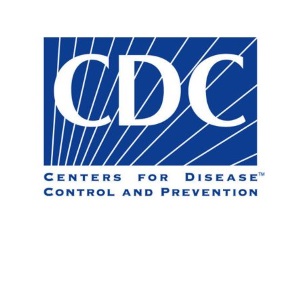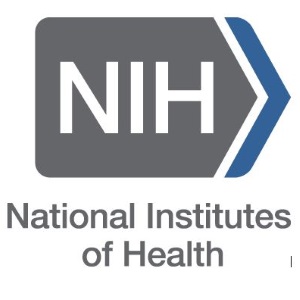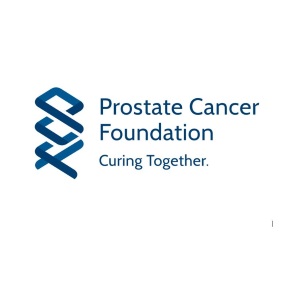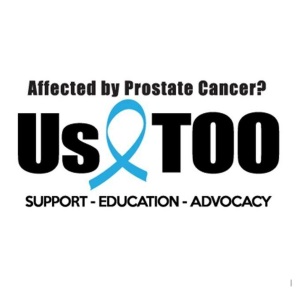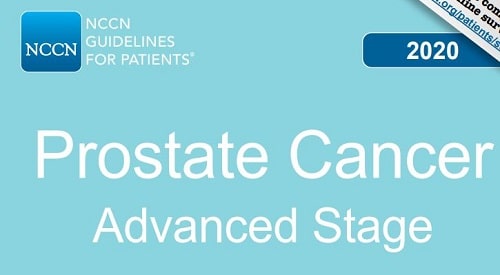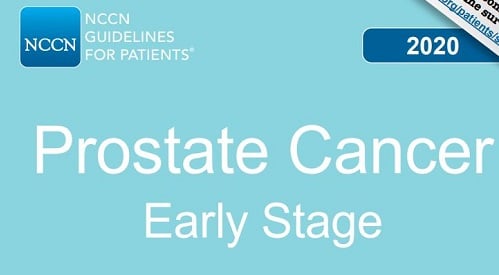Prostate Cancer Disparities
Voices about Prostate Cancer
Charlie Hill
Charlie Hill, a prostate cancer survivor, tells men who are reluctant to deal with their prostate health: “The strongest pitch that I like to bring up is: How selfish do you want to be?”
“Because while it is you and your body, it’s about the people who love you. So are you willing to look your daughter in the eyes, or look at your wife in the eyes, and say I don’t care enough about you to do something about this?”
Hill founded the Hampton Roads Prostate Health Forum to raise awareness about the prevention and treatment of prostate cancer in Virginia.
A 1-minute segment from a 3-minute video from The Skin You’re In.
Kareem Abdul-Jabbar
“If you’re like me, you’d rather talk about basketball or anything other than prostate cancer,” says professional basketball Hall-of-Fame player Kareem Abdul-Jabbar.
“But we can’t be silent when it comes to our own health. Prostate cancer affects one in eight men in the U.S. I beat it because I was screened and it was detected early.”
“Prostate cancer is often passed on through families. The NBA and the Prostate Cancer Foundation are asking you and your loved ones to know your risks and to get screened.”
A 30-second video from the National Basketball Association.
Robert Ginyard
“If I were to speak with a young man around 40, that’s the age group that I think particularly for African American men, they need to be on the lookout for prostate cancer,” says Robert Ginyard, who was diagnosed at age 48.
“I started getting tested at age 40 because of the history of prostate cancer in my family.
Don’t wait until you’re 50 because a lot of people think that prostate cancer is an old man’s disease, but at 40 you should begin to look at your family history and life in general and start taking care of yourself.”
A 1-minute video from ZERO – The End of Prostate Cancer.
Evander Holyfield and Brian Custer say "Man up and get checked"

Heavyweight boxing champion Evander Holyfield and sportscaster Brian Custer say to men “Man up and get checked for prostate cancer!“
“As men, we have this ego…we think we’re too macho to go to the doctor and undergo this type of check-up,” says Custer who survived a diagnosis of aggressive prostate cancer at age 42.
“But the truth is: If you don’t get checked, you’re cheating your family out of having a husband or father around. And you’re cheating yourself out of life. I hope when people hear my story, they’re motivated to take action by saying: ‘I’m going to get checked, I’m going to make sure my dad or husband gets checked, too.’”
Hear Brian’s story in a 2-minute video from the Prostate Cancer Foundation.
About Prostate Cancer
Here you can find out all about prostate cancer, including risk factors, symptoms, how it is found, and how it is treated.
Learn what prostate cancer is, who is at risk, and about symptoms, screening, diagnosis, and treatment for prostate cancer.
Explore the links here to learn about prostate cancer treatment, prevention, screening, statistics, research, and more.
When Men Say Their Dad Died from Bone Cancer...
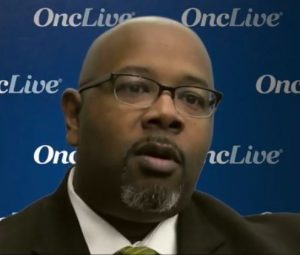
“So many men who come into my clinic and tell me their dad died of bone cancer; it is more likely prostate cancer that spread and they just didn’t know it,” says Kelvin Moses, MD, Director of the Comprehensive Prostate Cancer Clinic at Vanderbilt University.
“I’ve had men say they’d rather die than have me stick my finger in their rectum, and I tell them, ‘You just might’.”
Source: “Addressing prostate cancer’s racial disparity starts with you.”
Waiting for Symptoms May Be Too Late

The reality is most early stage prostate cancer that’s curable won’t have symptoms, and when patients start having symptoms like bone pain, weight loss, blood in the urine, they usually have more advanced disease and they may not be curable, ” says prostate cancer surgeon Jay Raman, MD, of PennState Health in Hershey, Pennsylvania.
Prostate cancer screening is really simple. It involves a visit with a health care provider, a rectal examination to feel the prostate and a blood test called PSA.
Family History is Key for Prostate Cancer

“A big, big factor that should be at the top of the list of risk factors for prostate cancer is family history,” says Jennifer Caudle, D.O, of the Rowan University-School of Osteopathic Medicine.
“Family history is key, it’s clutch for prostate cancer and so many other cancers. If you have a family history of prostate cancer, you need to make sure you are screened and your doctor needs to understand your family history.”
Watch “A Doctor Explains the Symptoms of Prostate Cancer,” a 5-minute video.
4 Things Black Men Should Know about Prostate Cancer
from the Memorial Sloan Kettering Cancer Center

One
Black men both get and die from prostate cancer at a higher rate. The reasons are complex and unclear. “Prostate cancer in Blacks tends to have biological characteristics associated with more aggressive disease,” says Philip Kantoff, Chair of Memorial Sloan Kettering’s Department of Medicine. “There is evidence suggesting that this is partly related to inherited genetic factors.”
Two
Black men should be screened for prostate cancer more proactively. Because Black men have a higher risk of developing and dying from prostate cancer, they are more likely to be saved by screening, Dr. Kantoff says.
Three
Black men and their doctors should be more cautious about active surveillance. Because Black men are more likely to develop more-aggressive prostate cancer, Kantoff maintains that active surveillance may be less appropriate for many Black men.
Four
Large research studies are seeking participants to help understand prostate cancer in Blacks. One is a large 5-year study looking at the underlying factors putting Black men at a higher risk for the disease.
Another study is enrolling 5,000 men with advanced prostate cancer from diverse populations to look at genetic differences as well as different treatment patterns across the groups.
Source: “4 Things Black Men Should Know about Prostate Cancer” on the Memorial Soan Kettering Cancer Center website (November 18, 2020)
Prostate Cancer Screening
The PSA test
PSA, or Prostate-Specific Antigen, is a protein produced by normal, as well as malignant, cells of the prostate gland. The blood level of PSA is often elevated in men with prostate cancer. However, PSA levels can also rise because of some some non-cancerous conditions, such as inflammation of the prostate and enlargement of the prostate. Most organizations recommend that men who are considering PSA screening first discuss the risks and benefits with their doctors.
Source: National Cancer Institute. Prostate-Specific Antigen (PSA) Test (2021)
American Cancer Society
The American Cancer Society recommends that beginning at age 45, black men who are at average risk of prostate cancer and have a life expectancy of at least 10 years have a conversation with their health care provider about the benefits and limitations of PSA testing and make an informed decision about whether to be tested based on their personal values and preferences.
Source: American Cancer Society. Cancer Facts & Figures for African Americans 2019-2021. Atlanta: American Cancer Society, 2019.
U.S. Preventive Services Task Force (USPSTF)
For men aged 55 to 69 years, the decision to undergo periodic prostate-specific antigen (PSA)-based screening for prostate cancer should be an individual one. Screening offers a small potential benefit of reducing the chance of death from prostate cancer in some men. However, many men will experience potential harms of screening, including false-positive results that require additional testing and possible prostate biopsy; over-diagnosis and overtreatment; and treatment complications, such as incontinence and erectile dysfunction.
For men 70 years and older, the USPSTF recommends against PSA-based screening.
For African American men, the USPSTF is not able to make a separate, specific recommendation on PSA-based screening for prostate cancer based on the available evidence. Decision analysis models suggest that given the higher rates of aggressive prostate cancer in African American men, PSA-based screening may provide greater benefit to African American men than the general population. These models also suggest a potential life-saving benefit for African American men when beginning screening before age 55 years.
The USPSTF believes that a reasonable approach for clinicians is to inform African American men about their increased risk of developing and dying of prostate cancer as well as the potential benefits and harms of screening so they can make an informed, personal decision about whether to be screened.
Source: U.S. Preventive Services Task Force (2018). The U.S. Preventive Services Task Force is an independent, volunteer panel of national experts in disease prevention and evidence-based medicine who make evidence-based recommendations about clinical preventive services. Most private insurance plans are required to cover without a copay recommended preventive services that receive a grade of A or B from the Task Force.
Recent news about prostate cancer screening

"Critically important for African American men to get screened"
“African American men tend to get more aggressive prostate cancer that metastasizes,” says Eldra Daniels, MD, a family physician with the Penn State Health Medical Group.
“They are getting diagnosed twice as much as Caucasian men, and their cancers are found at later stages. They might go to the doctor for back pain only to learn that it’s not arthritis, but instead is prostate cancer that had metastasized to their bones.
It is critically important they get screened for this cancer.”
See “Prostate cancer risks in African American men” on the Penn State College of Medicine News website (October 25, 2021)
"We encourage all men to have a conversation with their doctor about PSA screening"

The American Cancer Society’s 2022 Cancer Facts & Figures shows that death rates for cancer overall continue to decline for both men and women. However, the report also reveals that the death rate from prostate cancer is no longer declining as quickly, says Charles J. Ryan, MD, CEO of the Prostate Cancer Foundation (above).
“A main reason is that more men are being diagnosed at an advanced stage. For these patients, the 5-year survival rate is only 31%. Additionally, the disparities in prostate cancer incidence and death between Black and White men remain unacceptably high.”
“Survival from prostate cancer is significantly improved when caught early. Catching the disease early involves a conversation between a man and his doctor, as well as a physical exam and PSA testing. We encourage all men to have a conversation with their doctor about PSA screening and a conversation with their family about cancer history.”
Source: Prostate Cancer Foundation (January 14, 2022)
Digital rectal exam
“My actual doctor is going to insert his actual finger into my actual rectum to examine my actual prostate. And there he goes, he’s all the way in and he’s looking around…”
Television personality Mike Rowe has a digital rectal exam on camera to show how easy and quick (though briefly uncomfortable) it is to get your prostate checked.
A 2-minute humorous video from the prostate cancer support group ZERO — The End of Prostate Cancer.
Should you get your PSA level tested?
Knowing your PSA level can help determine your chance of having prostate cancer.
However, the PSA test can have negative consequences, as well. PSA levels are sometimes high when cancer isn’t present. And testing can’t always tell which prostate cancers are deadly and which ones won’t cause problems.
A 2-minute video from the Centers for Disease Control and Prevention ( CDC).
About the PSA test
“We use PSA in a few different ways to think about your risk for prostate cancer,” says Adam Feldman, MD, of the Massachusetts General Hospital Department of Urology.
“One is looking at it over time. So sometimes it’s elevated and if we just get one snapshot in time it may just be your baseline PSA. We also try and look at it in relation to your age and to the size of your prostate. We know that a larger prostate will make more PSA.”
A 2-minute video from the Massachusetts General Hospital.
"Make sure you're going to be around for your family"
“You can ignore it at your own peril. But if you love your family, love what you do, love the people around you, you’ve got to get screened. There’s no stigma to it. Just get it done. Make sure you’re going to be around for your family,” says television personality and prostate cancer survivor Al Roker.
“The problem with prostate cancer is there’s generally no outward symptoms. But if there are symptoms, you’re pretty well down the line with the progression of the disease. What’s the big deal? You just have to do it.”
A 2-minute video from The Patient Story.
Why Controversy over PSA test?
After years of widespread PSA screening, the U.S. Preventive Services Task Force in 2012 made the controversial decision not to recommend routine PSA testing on the grounds that too few lives are saved to justify all the harm that’s done treating healthy men.
Five years later in 2017, the Task Force changed its stance, recommending that the decision whether or not to do PSA screening should be made individually for each man aged 55 to 69. This new position has been criticized for not taking into account that African American men are more likely to be diagnosed at younger ages and with more aggressive tumors compared with White men.
Source: “USPSTF Backtracks, Now Says PSA Test Is ‘Individual Decision'” by Liam Davenport on the Medscape website (May 8, 2018)
"We don't have adequate screening data for African American men"

Despite the fact that African American men are much more likely to develop and die from prostate cancer as White men, “young African American men are poorly represented in PSA studies from which evidence-based guidelines are developed,” says Lori J. Pierce, MD, President of the American Society of Clinical Oncology.
“So, this really limits proper PSA guidance screening guidance for African American patients, especially for those who are younger than 55. And so, because we don’t have adequate screening data, there are differences in opinion as to what the guidelines should be.”
Source: “Younger African American Men With Prostate Cancer Show Improved Outcomes With More PSA Screenings.” (May 20, 2021)
"We need more studies to know what's right for high-risk men"

“One of the problems we have with the science is thinking about high-risk men,” says Alex H. Krist, MD, Chair of U.S. Preventive Services Task Force. The Task Force has not made any specific recommendations about screening in African American men.
“So men who are African American or men who have a family history of prostate cancer? Does screening help them any more than an average-risk man? We also don’t know if they have greater harms from the whole screening process. We need more studies to know what’s right for high-risk men.”
Source: “Screening for Prostate Cancer ,” a 3-minute video from the U.S. Preventive Services Task Force (October 9, 2018) The Task Force
American Cancer Society: Advances have lessened over-detection and over-treatment from PSA testing
“Controversy remains about the underutilized potential of the PSA test for reducing prostate cancer mortality by detecting potentially fatal disease earlier. The value of screening is especially salient for Black men, who have had a steeper drop in PSA testing than White men despite two-fold higher prostate cancer mortality.
Proponents of testing are bolstered by advances in mitigating over- detection and over-treatment through more stringent diagnostic criteria and active surveillance for low-risk disease.
In addition, promising new approaches to screening that include the use of molecular markers and magnetic resonance imaging-targeted biopsy have demonstrated success in the detection of clinically significant cancer with limited over-detection.”
Source: American Cancer Society. Cancer statistics 2022.
New Research About Prostate Cancer Screening in Black Men
Opinions About Earlier Prostate Cancer Screening
"Black men should start PSA screening earlier"
“When we are discussing early-stage prostate cancer, there are no early warning signs or symptoms,” says radiation oncologist Jerome M. Butler, MD, of North Carolina.
“Given that we know that African American males have a higher risk of prostate cancer, we believe that prostate cancer screening cannot be ignored.
For asymptomatic men of average risk, prostate screening should begin at ages 55 to 69. We believe that African American males should start earlier.”
A 3-minute video from the SERO Radiation Oncology Group of Charlotte, North Carolina
"Know your prostate health beginning at age 40"
“All Black men are at high risk for prostate cancer,” says Thomas Farrington, founder of the Prostate Health Education Network (PHEN) and a prostate cancer survivor.
“It is very important to know your prostate health. Knowledge is the best defense against prostate cancer. You begin that by knowing the health of your prostate.
So we recommend that men begin early detection testing to know their prostate health beginning at age 40 using a PSA test and the digital rectal exam. Because early detection is so crucial to beating this disease should you be diagnosed with it.”
A 1-minute video from the Dana-Farber Cancer Institute.
Should Black men get their PSA levels checked?
Yes, says Richard Kennedy, MD, whose prostate cancer was discovered after a high PSA test.
“The dilemma is in people of color, we die at greater rates with prostate cancer, we tend to have more aggressive cancer at the time of diagnosis than other populations. So for us, it’s different. We tend to be always at the end of the scale. Prevention is the key,” says Kennedy.
“The one thing that has been proven over time is that most disease when it does affect people of color, it tends to be more aggressive. That’s probably happening more because we show up late. “
A 2-minute segment of a 6-minute video.
Genetic Testing
“If we want to understand prostate cancer, we have to understand genes. That’s why the genes of prostate cancer patients are so important. They represent the next step in our collective fight against this disease.”
The PROMISE study
What can genetic testing tell men about prostate cancer?

Test results may influence your:
- Screening frequency. It could mean more active surveillance from a younger age.
- Diagnosis: It could reveal that you’re more likely to develop an aggressive form of prostate cancer which can affect your initial treatment options.
- Treatment options: Men with specific genetic mutations may respond better to certain drugs and treatments and may affect your eligibility for some clinical trials.
- Relatives’ health decisions: It can help family members understand and manage their risk for cancer. If they have the same mutation, screening can begin at an earlier age.
See “Genetic testing for prostate cancer: What men and their families should know” by Parker Read on the University of Texas Southwestern Medical Centner website (September 10, 2020)
Who should consider genetic testing for hereditary prostate cancer?
“There are a few scenarios for men to consider genetic testing for inherited prostate cancer,” says oncologist Veda Giri, MD, Director of the Jefferson Clinical Cancer Genetics Service in Philadelphia.
“One is for a man who has metastatic disease and who has gone through the standard lines of treatment and their disease is progressing. In that scenario, precision oncology is really where genetics is taking off in terms of helping to guide targeted therapies. The genetics can help inform additional options for treatment.
The other group of men who would want to consider genetic testing are those that have a family history of specific cancers. This is really important for men to consider for their families. Breast cancer, ovarian cancer, pancreatic cancer, colon cancer, all of these cancers can be linked to an inherited risk for prostate cancer based upon the genes that we might find.”
A 2-minute video from OncLiveTV.
A man should think about genetic testing if...
“…his Gleason score is seven or higher and if he has at least one close blood relative with breast or ovarian cancer at age 50 or younger. Or if he has at least two family members with breast, ovarian or prostate cancers at any age.
The actual test is done in a flash. All you need to do is provide a blood or saliva sample. Your urologist may suggest seeing a genetic counselor if the results are positive or uncertain.
Health insurance often covers genetic counseling and tests if they are medically needed.”
A 4-minute video from the Urology Care Foundation.
African American Prostate Cancer Patients Get Fewer Actionable Results, More Variants of Uncertain Significance

African American men with prostate cancer are receiving more limited germline (hereditary) genetic testing for cancer risk and getting more uncertain results, researchers report.
“Germline testing for prostate cancer is central now to informing treatment in metastatic, castration-resistant disease,” explains Veda Giri of Thomas Jefferson University and the Sidney Kimmel Cancer Center’s Cancer Risk Assessment and Clinical Cancer Genetics Program, adding that “there’s an evolving role for it in the localized disease management setting, as well.”
Although prostate cancer disproportionately burdens African American men in comparison to men of other ancestries, Giri said, germline testing rates tend to be low in this patient group, potentially contributing to an inability to fully understand the suite of germline variants that bump up cancer susceptibility in African American men and in their families.
In her study of 427 prostate cancer patients — 190 white and 237 African American men — who had germline cancer susceptibility testing from 2012 to 2020, known risky genetic variants were found in more than 11 percent of White men, but in fewer than 6 percent of the African American patients.
In contrast, variants of uncertain significance (VUS) rates were more than 25 percent in the men with African American ancestry, but just over 16 percent in the White participants. [A “variant of uncertain significance” is a genetic change whose impact on the individual’s cancer risk is not yet known. In this case, it reflects the less frequent study of variants in Black cancer patients.]
Giri called for broader panel testing so the field can better understand the germline variants that contribute to prostate cancer risk in the African American men and improve the treatments available to them. “There’s a critical need to engage more African American males and families in genetic testing and in research,” she emphasized.
See “African American Prostate Cancer Patients Get More VUS, Fewer Actionable Results, Studies Show” by Andrea Anderson on the Precision Oncology News website (June 7, 2022)
See the full text of the scientific paper “Germline Variant Spectrum Among African American Men Undergoing Prostate Cancer Germline Testing: Need for Equity in Genetic Testing” by Veda N. Giri et al.
Two prostate cancer genetic studies to join
The PROMISE study
Looking at the link between genes and prostate cancer

Researchers from Johns Hopkins University and the University of Washington School of Medicine are collaborating on a first-of-its-kind long-term observational study to learn how genetic differences can affect patient outcomes. The study is dubbed PROMISE (Prostate Cancer Registry of Outcomes and Germline Mutations for Improved Survival and Treatment Effectiveness).
Above is Dr. Heather Cheng, MD, PhD, of the University of Washington School of Medicine, director of the Prostate Cancer Genetics Clinic at Seattle Cancer Care Alliance and co- lead investigator of PROMISE.
See “First-of-its-Kind Study Looks at Link Between Genes and Prostate Cancer” (2021).
Joining the PROMISE study
PROMISE is building a genetic database directly from a grassroots network of patients so that every prostate cancer patient who is interested can better understand their genetic risk and potential treatment options.
Men with prostate cancer are eligible to join. Participation is free. PROMISE will send you a simple, home-based DNA test kit. Simply provide a saliva sample and return it via US mail. The kit will screen for any of the 30 cancer risk genes PROMISE is testing.
PROMISE will provide you with a licensed genetic counselor to help you understand what your results mean for you. You’ll discover if you have any gene mutations that affect your care plan. These results may inform you of available treatment options and previously unknown risks of family members developing prostate cancer.
Watch the video above and for more information, see prostatecancerpromise.org
Metastatic Prostate Cancer Project
Looking at advanced prostate cancer's genetic and molecular causes

The Metastatic Prostate Cancer Project is a nationwide genomic research study for men with advanced or metastatic prostate cancer. It seeks to generate the most comprehensive database that will be shared with the entire research community to accelerate discoveries.
“This project will connect men with metastatic and/or advanced prostate cancer across the country with scientists using cutting-edge technology to study cancer’s genetic and molecular causes. While prostate cancer is very common, few men have the ability to contribute their tumor samples and clinical data to cancer research, largely because they do not have a way of doing so.”
“We believe everyone should have the opportunity to contribute to research, especially now that the combination of genome sequencing and internet-based communication has made it easier to give people that opportunity.”
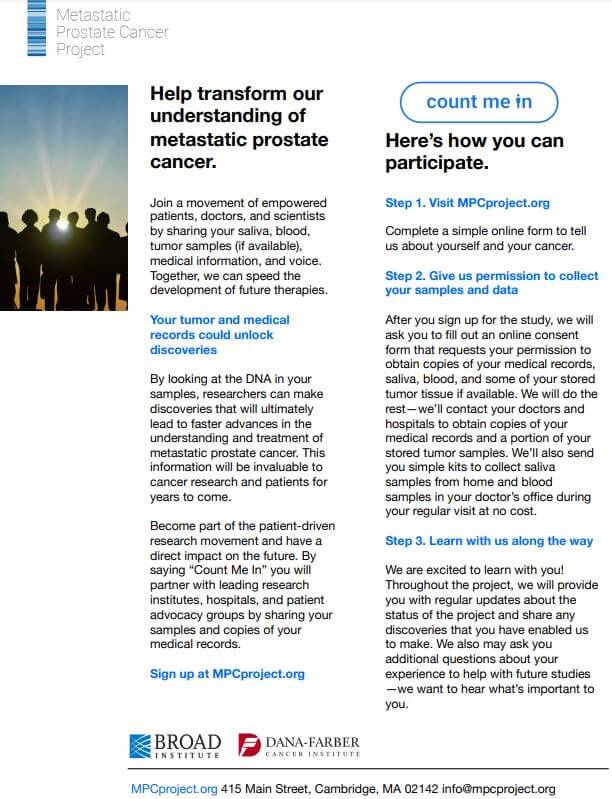
For more information, download this one-page information sheet.
If you have any other questions, email info@mpcproject.org or call 651-293-5029.
Prostate Cancer Support Groups
“ZERO — The End of Prostate Cancer offers comprehensive support for prostate cancer patients through our website, printed materials, videos, and webinars. Our experienced case managers help patients access financial resources, cut through insurance and Medicare red tape, and find emotional support. For men with advanced prostate cancer who could not afford treatment, our financial assistance program provides grants.”
The Prostate Cancer Foundation invests in the most promising research on prevention, detection and treatment and in bringing innovative solutions to market quickly, with the goal of improving the lives of patients and their families.
Prostate Cancer International provides straightforward, accurate, actionable information that is customized, to the greatest extent possible, to the individual needs of particular people, and to enable them to talk carefully and knowledgeably with their doctors, their families, and others about prostate cancer.
Among the Prostate Conditions Education Council’s objectives are to increase awareness of prostate cancer and its treatment options for all stages of the disease; to reach patients, caregivers and medical professionals with updated and current information; to provide access to free early detection for prostate cancer and other men’s health issues, including evaluation for advanced cancer patients.
Us TOO‘s mission is to raise awareness and provide educational resources and support services to those affected by prostate cancer to help them learn to fight this disease. Us TOO provides comprehensive educational materials and resources along with support services that include more than 200 volunteer-led support groups across the U.S. and abroad.
Active Prostate Cancer Facebook Pages
Downloads
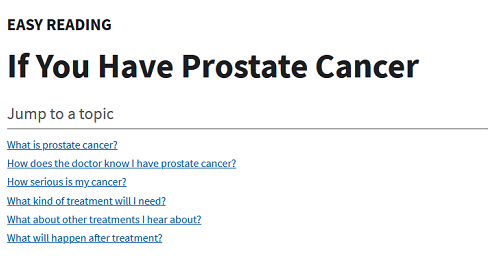
“If You Have Prostate Cancer”
A short, simple guide to cervical cancer from the American Cancer Society. Includes definitions of all the terms used in diagnosing and treating prostate cancer, along with dozens of questions to ask at each stage.
Free download here
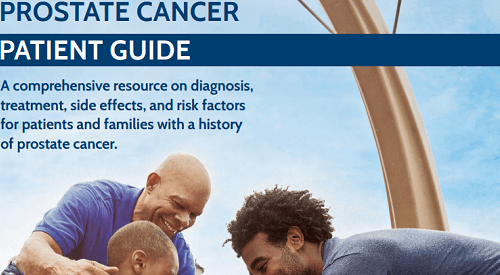
The Prostate Cancer Patient Guide from the Prostate Cancer Foundation has been updated for 2021 and was compiled with the contributions of top-tier doctors and researchers in prostate cancer. Includes new FDA approvals, helpful graphics and worksheets, and a revised section on the treatment of advanced prostate cancer.
Free download here
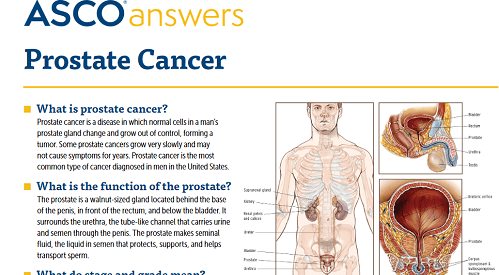
Two pages of answers to five major questions about prostate cancer, 12 prostate cancer vocabulary defined, and 15 questions to ask a health care team about your prostate cancer. From the American Society of Clinical Oncologists, a professional organization for physicians and oncology professionals caring for people with cancer.
Free download here

A 20-page guide to prostate cancer, including screening, diagnosis, treatment, and clinical trials. From ZERO, a nonprofit with the mission to end prostate cancer.
A 52-page booklet about prostate cancer basics, diagnosis, treatment, side effects, follow-up care, a dictionary of prostate cancer terms, and worksheets. From the American Society of Clinical Oncologists, a professional organization for physicians and oncology professionals caring for people with cancer.
Free download here
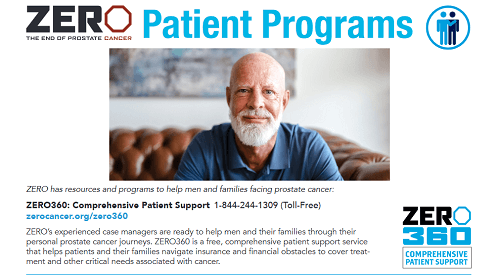
Five patient support programs from Zero The End of Prostate Cancer, including a a free, comprehensive patient support service that helps patients and their families navigate insurance and financial obstacles to cover treatment and other critical needs associated with prostate cancer.
Free download here
National Comprehensive Cancer Network Guidelines for Patients are developed by the National Comprehensive Cancer Network, an alliance of leading cancer centers across the United States devoted to patient care, research, and education. The Guidelines present information in an easy-to-learn format for people with cancer and those who support them and explain the cancer care options likely to have the best results.
Reports
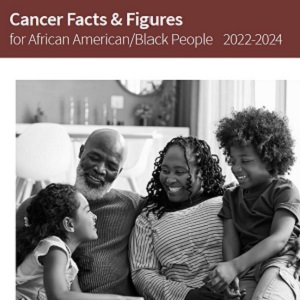
American Cancer Society. American Cancer Society. Cancer Facts & Figures for African American/Black People 2022-2024.

American Association for Cancer Research: Cancer Disparities Research Report 2020
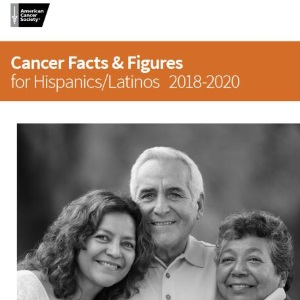
American Cancer Society. Cancer Facts & Figures for Hispanics/Latinos 2018-2020. Atlanta: American Cancer Society, 2018


